Taliban FM Describes Iran Visit As Positive, Reportedly Meets Opposition
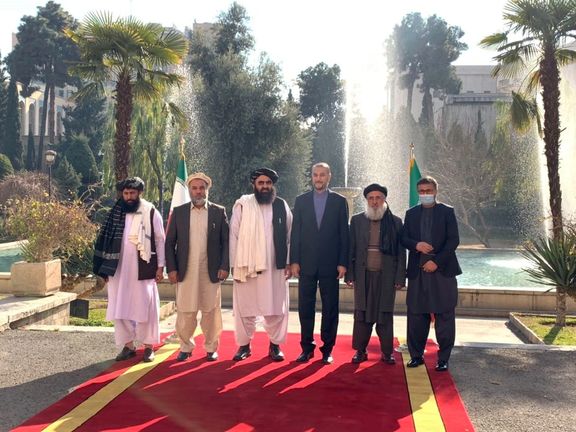
Taliban's acting foreign minister Amir Khan Muttaqi said Sunday that he has held positive talks with Iranian officials during his visit to Iran.

Taliban's acting foreign minister Amir Khan Muttaqi said Sunday that he has held positive talks with Iranian officials during his visit to Iran.
Muttaqi, who arrived in Iran Saturday evening at the head of a high-ranking delegation, said on Sunday that his meetings with Iranian officials were focused on trade, oil, transit and security.
He noted that the Taliban seeks to establish good relations with all the countries in the region, particularly with Afghanistan’s neighbors.
He met with Iranian Foreign Minister Hossein Amir-Abdollahian and Hassan Kazemi Qami, the Iranian president's special envoy to Afghanistan. Tehran says some agreements were reached on banking cooperation, cross-border markets, mining, and sports during the meetings.
Afghanistan International quoted unnamed sources as saying that during his stay in Tehran, Muttaqi also held meetings with some opposition figures including former Herat governor Mohammad Ismail Khan and Mawlawi Habibullah Hesam, the head of Afghanistan’s Islamic Brotherhood.
It added Muttaqi was also scheduled to meet Ahmad Massoud, the leader of the National Resistance Front of Afghanistan, but representatives of the front said the meeting did not happen, although Massoud had traveled to Tehran from Mashhad on Saturday.
Earlier on Sunday, Iran’s Foreign Ministry spokesman rejected reports about Tehran’s decision to hand over the Afghan embassy in Tehran to the Taliban.
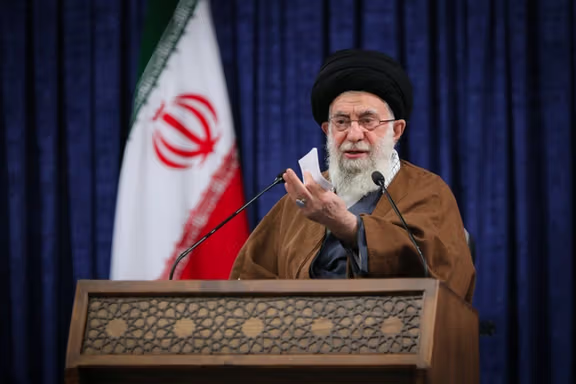
Iran's leader Sunday showed the first public sign of readiness to compromise with the West over the nuclear issue, while maintaining enmity with the United States.
In a televised speech Sunday morning Ali Khamenei said that "Negotiations with the enemy at a certain juncture does not necessarily mean surrendering." The anti-Western ruler of Iran tried to convey the message to his hardliner supporters that although he is prepared for another round of "heroic flexibility"in a bid to have sanctions lifted, his opposition to the United States is unwavering.
"Not surrendering to the enemies, is one of the principles of the Islamic revolution. However, holding talks and negotiating with the enemy at a certain juncture does not mean surrendering to it. We have never surrendered so far, and we never will," Khamenei said.
Khamenei’s statement comes after many politicians and pundits in Iran and abroad have been saying for years that Iran should try direct negotiations with the US, but Khamenei explicitly banned it in 2018.
Portraying the United States as the Islamic Republic's biggest enemy, Khamenei said: "America’s deep hostility and spite toward Iran stems from the Iranian people’s revolutionary, religious viewpoint on the current issues of the world. That is why the US, the leading “arrogant power”, opposes the Islamic Republic of Iran."
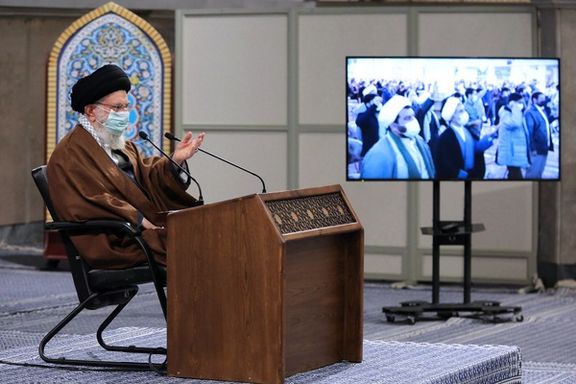
Claiming that US stances vis-a-vis Tehran is based on miscalculations, Khamenei reiterated: "The US system of calculation is defective. It cannot fathom the truths about Iran. When their calculation of the existing situation is wrong, their decisions are wrong too. This is why they have been unsuccessful so far and they will continue to be unsuccessful, God willing."
Based on his accounts of certain episodes in Iran's history in the 18th and 19th and 20th centuries, Khamenei said that only the grand ulema [prominent Shiite clerics] are capable of mobilizing masses of the people against big powers. Khamenei concluded that this reveals why "arrogant powers are against religion, clerics” and Shiite political Islam.
Khamenei reiterated: "The United States is basically against the Islamic regime in Iran because Washington knows that this system is the outcome of religion and is a manifestation of the Iranian nation's religious beliefs." He added: "Religious zeal based on reason turns threats into opportunities. An example of this is the war imposed by Saddam on Iran. The US, USSR, NATO, etc. united in this international war to defeat Iran, but the people’s zeal that is based on faith defeated all of them."
Meanwhile, expounding on his conspiracy theory about the West, Khamenei said that "The enemies are trying to erode Iranians' responsiveness to the principles of the Islamic revolution through a massive propaganda campaign on cyberspace and foreign-based [Persian] media. However, he did not mention that widespread and systematic corruption among clerics and officials has vastly contributed to the erosion of the underlying beliefs in the ruling system.
He also did not mention that many blame his regime's mismanagement for wasting a wealthy country’s resources, or criticism that his own unreasonable ambitions led to wasting billions of dollars on a nuclear program that has had no positive outcome for the people in more than four decades.
Nonetheless, he warned Iranian intellectuals that "It is unfair to say that the principles of the Islamic revolution do not serve the people's interest and do not guarantee their future."
Khamenei's critics even those such as former President Mahmoud Ahmadinejad have said on various occasions that nothing has remained of the main principles of the revolution, namely independence, freedom and an Islamic republic.
Critics have often argued that the regime's over-reliance on Russia and China and massive concessions to them has undermined Iran's independence. Meanwhile, thousands of political prisoners languishing in Iranian prisons, one of whom died in custody on Saturday because of neglect, bear witness that there is no freedom of expression in Iran. Critics say nothing has remained of the idea of a Republic in Iran particularly after the latest round of presidential election where everyone knew the winner months before the voting day.
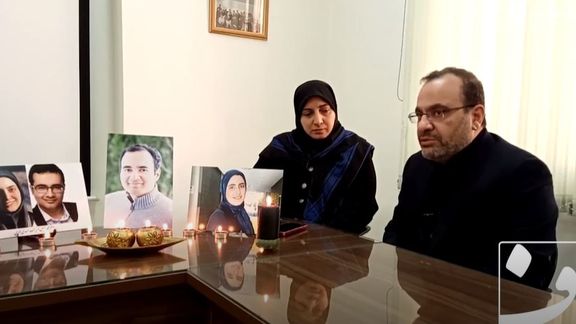
Parents of two victims in the downing of an airliner say it was used as a "human shield" to prevent possible US retaliation in the wake of Iran's missile attack on US bases in 2020.
Dr Mohsen Asadi-Lari, a former high-ranking health ministry official, and his wife Dr Zahra Majd who lost both their children, Mohammad-Hossein and Zeinab, in the downing of the Ukrainian plane on January 8, 2020 have broken their silence about the incident which they say cannot be reduced to "human error" as Iranian authorities claim.
"We have concluded that they used the plane as human shield. I'll be frank … They probably wanted to down it and blame it on the US," Asadi-Lari told Ensaf News, a reformist website, in a long interview conducted Tuesday but published Saturday. He also claimed that similar incidents have happened in the past but did not cite any particular example.
Apparently referring to remarks made by Revolutionary Guard (IRGC) officials, Asadi-Lari said officials have admitted that a war with the US could happen if the plane was not shot down. "They say if the plane was not downed a difficult war would happen the next day. The US would have attacked, and ten million lives would be in danger."
An early-morning disaster
Ukraine's flight PS752 was shot down by two air-defense missiles fired by the IRGC on January 8, 2020, as it took off from Tehran’s Imam Khomeini International Airport. Only hours earlier, the IRGC had fired more than a dozen missiles at Iraqi bases hosting US and coalition troops in retaliation for the killing of the IRGC Qods Force Commander Qasem Soleimani who was targeted and killed in Baghdad by a US drone strike just five days earlier.
Despite expecting retaliation from the US, the IRGC which is responsible for air defense of the capital did not close the civilian airspace in the early morning hours of January 8.
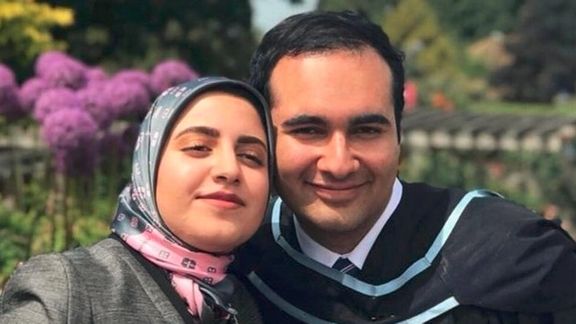
Secretary of Ukraine’s national security and defense council, Oleksiy Danilov, in April told Canada's The Globe and Mail that he believed the downing of the plane was a "deliberate attack" to prevent retaliation for Iran's attack on US forces in Iraq.
The Asadi-Lari family criticized Iran's trial of ten low-ranking military personnel which began in November in Tehran, saying that they were not even sure about the identities of those on trial, as defendants always sat with their backs to the plaintiffs during court sessions.
"The actions taken by the team that planned, ordered, and carried out the firing [of the missiles at the plane] have not been included in the case files," Asadi-Lari said in another interview published Saturday by the Iranian Students News Agency (ISNA). "What happened later, including the cleaning up of the scene and pillage of the belongings of the passengers, destruction or confiscation of some of their belongings [such as electronic devices and phones] are also among the things that should have been reflected in the case files."
Asadi-Laris also accused the authorities of "increasingly distorting the truth". "Woefully, they are adding up to the atmosphere of fear and intimidation," Asadi-Lari told Ensaf News, adding that the families who live in Iran have kept their silence and not spoken with the media out of fear of retribution.
Families desparate for truth and justice
In his interview with ISNA, Asadi-Lari said that more than 100 families including his family have filed lawsuits with the Iranian judiciary for the prosecution of those responsible, but the court has ignored their claims against some officials including IRGC Aerospace Commander Brigadier General Amir-Ali Hajizadeh.
Hajizadeh took responsibility for the incident three days after official denials of the truth about the incident. Victims' families were informed by Tehran Military Prosecutor's Office in August that Hajizadeh and eight others had been given immunity from prosecution.
Since the admission, Tehran has refused to allow an independent investigation into the incident and according to Ukraine and Canada that had dozens of citizens and permanent residents aboard, has not provided full and convincing answers to questions that can shed light as to what really happened.
On Saturday, Canada in response to an inquiry by Iran International called Iran's downing “a Canadian tragedy” and called for justice and transparency.
A Canadian court just recently awarded C$107 million ($84 million) to the families of six people who had sued Iran. More court cases are pending in Canada.
Lari and his wife, both professors of Iran Medical Sciences University, say the whole family, including their two children who were students in Canadian universities, were devastated by Soleimani's killing and were very worried about a US retaliation for Iran's missile attack while the family was on their way to the airport. Before the flight took off, their son Mohammad-Hossein had been praying for Soleimani who was buried the day before.
Unlike parents and family members of many other victims of the tragedy that killed all 176 onboard, the Asadi-Lari family are not members of the Canada-based association representing the victims' families. The association does not recognize the eligibility of the Islamic Republic's Judiciary for the investigation of the incident and has repeatedly called for top Iranian officials, including Supreme Leader Ali Khamenei as commander-in-chief of the Armed Forces, to be held responsible.

Remarks by a former Iranian diplomat who is now a Princeton University scholar over Iranian threats against American officials have led to controversy.
In a documentary to mark Qasem Soleimani’s second death anniversary aired by state TV earlier this month, Hossein Mousavian talked about how Iran’s threat to avenge Soleimani killing frightened the wife of Brian Hook, Washington’s special envoy for Iran at the time.
“An American told me that Brian Hook’s wife had not slept for several days and that she was shaking and crying. That’s how afraid they were” Mousavian gloated in the documentary.
In a Friday statement condemning Mousavian, advocacy group United Against Nuclear Iran (UANI) called on Princeton University President Christopher L. Eisgruber “to dismiss him from any association or affiliation with Princeton without delay”, noting that “Ambassador Mousavian’s affiliation with Princeton is a stain on the university’s reputation and credibility”.
Late in December, an American academic who was imprisoned in Iran for 1,216 days, said Mousavian is sympathetic to the Iranian regime, claiming that he stymied efforts to free him from prison.
Mousavian, who traveled to Iran to attend the funeral service of Soleimani, was Tehran’s ambassador to Germanywhen four Iranian dissidents were assassinated at Berlin's Mykonos restaurant in 1992.
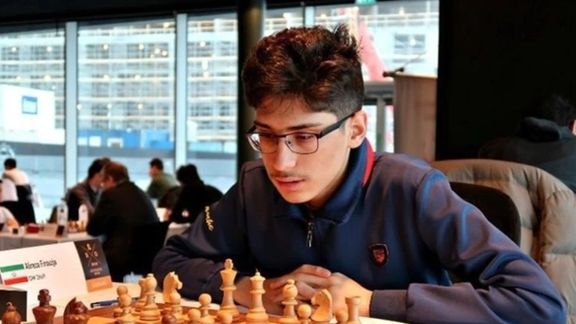
Alireza Firouzja, the 18-year-old chess player who left the Iran team in 2019 due to a ban on competing with Israelis, has won a top international award.
Voters on Chess.com, an internet server, news and networking website with 77 million global users, chose him as the ‘Rising Star’ of 2021, and ranked him second as ‘Player of the Year.’ Firouzja’s game against Hungarian grandmaster Richard Rapport was judged the third best game of 2021.
Magnus Carlsen, the 31-year-old world chess champion, was voted Player of the Year. In December, Carlsen in a blog post wrote he was unlikely to play another match defending his title unless against someone from the “next generation,” which was taken to mean Firouzja, second in world rankings.
Firouzja won the Iranian championship aged 12 and was a grandmaster at 14. He is the second-youngest player ever to reach a rating of 2700, which he did at 16. In December 2019 Firouzja became the first-ever Iranian male chess player to come second in the World Rapid Chess Championship in Moscow.
Firouzja renounced his Iranian citizenship in 2019 over pressure to forfeit matches with Israeli competitors, and now competes as a French citizen at international tournaments.
Iran is among states that do not recognize the state of Israel, a refusal that goes back to the pronouncement by 1979 Revolution leader Ruhollah Khomeini that Iran could have formal relations with any state in the world other than Israel or apartheid South Africa. Tehran prohibits sportspeople from playing against Israeli competitors or pressures them to intentionally lose games so as to avoid competing with Israelis.
Ali Khamenei, Iran’s supreme leader, has often praised Iranian athletes who refuse to play against Israelis, and in September 2021 said they should continue to do so even if facing punishment by international sports bodies.
In November 2020, vice-President of the International Chess Federation Nigel Short warned Iran's Chess Federation that it could be banned from international events if Iranians were not allowed to compete against Israelis.
There have been other sporting and cultural boycotts of Israel in recent years. In 2018 Argentinian soccer players including Lionel Messi refused to play a friendly game in Jerusalem because the ground was on the site of a razed Palestinian village. This week, more than 20 acts withdrew from the Sydney Festival because of Israeli funding. But the Islamic Republic’s ideological basis for its boycott is much more radical. Iranian officials have often called for Israel’s destruction and are supplying arms and money to militant groups.
Among dozens of Iranian athletes who have emigrated over the past two decades, some said they did so because officials forced them to lose titles by refusing to compete against Israelis.
The internationally renowned chess player Ghazal Hakimifard gave up Iranian nationality in 2020 in protest and plays for Switzerland.
Some female athletes say they have left the national team because of mandatory hijab (dress code). Grandmaster Mitra Hejazipour was expelled from the chess team for removing her headscarf during international tournaments.
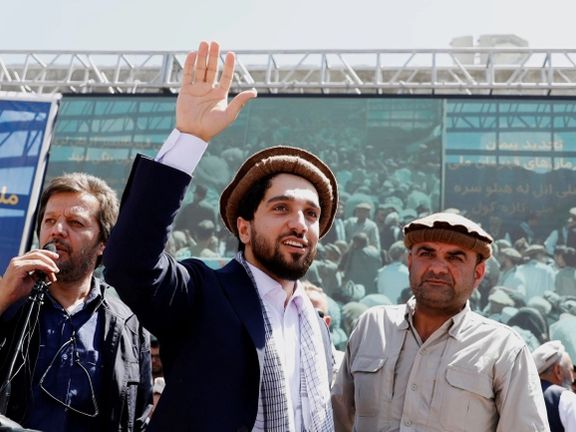
Two sources have told Afghanistan International that the Taliban foreign minister visiting Iran will have a meeting with opposition figures Ahmad Massoud and former Herat governor Ismail Khan.
Taliban's acting foreign minister Amir Khan Muttaqi arrived in Tehran at the head of a high-ranking delegation on Saturday to hold talks with senior Iranian officials.
Later two reliable sources told Afghanistan International that Mutaqqi arrived in Tehran with the invitations of the Islamic Revolution Guard Corps (IRGC). A photo taken in Kabul airport before his departure showed a Mahan airline plane waiting on the tarmac. Mahan is an IRGC-affiliated company.
Representatives of Afghanistan’s Resistance Front did not comment on the possible meeting between Massoud and Motaqqi. The Taliban acting foreign minister had previously offered truce and peace to the resistance Front.
Afghanistan’s economic situation has badly deteriorated since the fall of its internationally recognized government and the Taliban desperately need foreign assistance. Iran has insisted that they should form an inclusive government.
Iran has close ties with the anti-Taliban figures and also cordial relations with the Taliban, whose victory in August was seen by Tehran as a defeat for the United States.